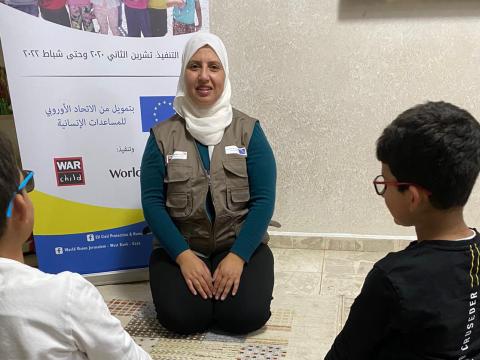Opening Windows to The Outside

Dair Nitham is a Palestinian village located north of Ramallah in the occupied West Bank, home to about 1,000 residents. The main road to access the village is heavily restricted due to the presence of a nearby Israeli illegal settlement, Beit El, as well as a large military checkpoint.
When the COVID-19 pandemic first spread in the area, a curfew was imposed throughout the area, forcing Palestinian families to confine themselves at home.
“During the pandemic, the Israeli forces closed the main road to the village, which was very problematic for my children, whose school is located outside the village,” recalls Jamila, a mother of two eight-year-old twins, Mohammad and Khalil. “This would have obliged them to walk through the hills, which not only would have taken them an hour longer, but also would have exposed them to settler attacks, which occur frequently in this area.”
With both COVID-related restrictions and the closure unilaterally imposed by Israeli forces, Jamila’s children had no choice but to stay at home, which quickly created problems within the family. “Smart phones and the internet were my children’s only window to the outside world,” said Jamila, “but soon I noticed that they were isolating themselves and communicating less with family members. They also often watched violent videos, which made them more aggressive toward one another and with other family members. This got me worried as a mother; I felt anxious and stressed most of the time. I started worrying about my family’s health, economic situation, and the collapse of social norms. It felt as if the situation at home and in society by and large had become out of control.”
After several months, when the COVID-related restrictions were finally loosened, the children were reluctant to return to school, and stopped playing outside with the other children, preferring to remain alone on their phones. “Even after the closure was lifted, I saw that my children had lost interest in the school activities or in playing in the neighborhood. This got me worried, and I did not know what to do,” said Jamila.
Sometime after this, the “SAFE Project” was launched in Jamila’s village. A project funded by EU Humanitarian Aid and implemented by War Child Holland and World Vision. “With this project, I finally saw the light at the end of the tunnel,” confirmed Jamila. The mother of four received an eight-day training on the ‘Team Up’ methodology, as well as the caregiver’s support methodology. “This provided me with the necessary skills to deal with my children, to solve problems, to get rid of negative emotions, and to reinforce positive behaviors,” explained Jamila.
Equipped with these new tools, Jamila started to organize her children’s time between studying and playing. She also started playing interactive games with her children. She registered her kids in a Team Up activity as well. She started joining their games together and felt a kind of success when Khalil would tell her he liked the activities she organized.
“The skills and knowledge I gained as a caregiver through the trainings were reflected on my children and my family. I changed the way I interact with my children and my husband, and we learned how to improve our communication and find solutions together for the problems we face,” said Jamila.
“Through this whole situation, I learned that my role within the community is greater than what I thought. When I realized this, I started working with a children’s group from the nearby village of Budrus, using the skills I learned through the SAFE Project training. I want to open as many windows as I can, not just for myself and my children, but for all the children and their families in our area,” affirmed Jamila.
Background:
The SAFE Project: ‘safe access to schools and psycho-social support for children in the West Bank’ is an 18-month long project that aims to address increasing protection concerns and a lack of safe learning spaces. It’s funded by the European Union and implemented by War Child Holland and World Vision. ‘SAFE’ is implemented in educational facilities in Area C and Hebron H2, in cooperation with the Ministry of Education. It is supported through 500,000 Euros in humanitarian funding from the European Union.